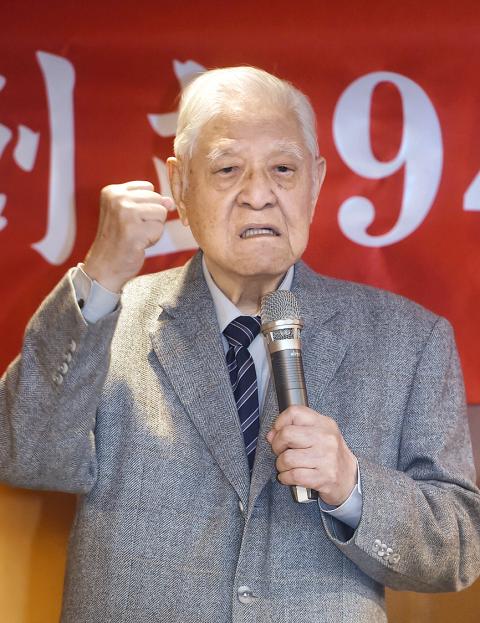Former president Lee Teng-hui (李登輝) yesterday followed up on his recent comments about President Tsai Ing-wen’s (蔡英文) cross-strait policy by reiterating his position on ending the “status quo” with China, saying that “Taiwanese understand that the nation has to walk its own path without fear.”
The statements came in the wake of his recent interview with Japan’s Sankei Shimbun, in which Lee attributed Tsai’s fall in popularity polls to her stance on maintaining the so-called “status quo” in relations with China, which Lee said is a deviation from popular sentiment.
“Taiwan is Taiwan, how can it maintain the ‘status quo’ with China? Taiwanese are opposed to that,” Lee said on the sidelines of an event in Taipei.

Photo: Fang Pin-chao, Taipei Times
Presidential adviser Koo Kwang-ming (辜寬敏), who also attended the event, said that 70 years ago there were only three independent nations in Asia and the rest were colonies, whereas today there are more than 20 sovereign nations in the region.
“Only Taiwan’s sovereignty is unclear,” Koo said.
If Tsai wants to talk about “maintaining the ‘status quo,’ then she should lay out a plan for the future,” Koo said, adding that failure to do so would be irresponsible.
As for his comments made in the same interview with the Sankei Shimbun, in which he said Tsai lacks courage and decisiveness, Lee said he was not criticizing her, but rather encouraging her to work harder.
Lee said that many problems remain unsolved, citing the lapses in Mega International Commercial Bank’s (兆豐銀行) internal management and controls exposed by the New York State Department of Financial Services’ announcement in August and a US$180 million fine of the bank’s New York branch for breaches of the US Bank Secrecy Act, pension reform disputes, labor disputes and the recent dissolution of TransAsia Airways Corp (復興航空).
Lee said problems such as those with TransAsia and Mega Bank are due to the handling of banking and financial matters by Chinese Nationalist Party (KMT) officials installed in their posts during the former administration, adding that Taiwan’s problems cannot be solved until these issues are dealt with.
In response to media queries on the Tsai administration’s performance over the past six months, Lee said the government is not handling the issues the public expects it to deal with, citing a drop in Tsai’s approval ratings from 50 percent to about 30 percent.
“[Tsai] must be careful in regard to the issues I just mentioned, otherwise her approval ratings will drop further. If she is not careful, she could end up like the South Korean President [Park Geun-hye],” Lee said.

INVESTIGATION: The case is the latest instance of a DPP figure being implicated in an espionage network accused of allegedly leaking information to Chinese intelligence Democratic Progressive Party (DPP) member Ho Jen-chieh (何仁傑) was detained and held incommunicado yesterday on suspicion of spying for China during his tenure as assistant to then-minister of foreign affairs Joseph Wu (吳釗燮). The Taipei District Prosecutors’ Office said Ho was implicated during its investigation into alleged spying activities by former Presidential Office consultant Wu Shang-yu (吳尚雨). Prosecutors said there is reason to believe Ho breached the National Security Act (國家安全法) by leaking classified Ministry of Foreign Affairs information to Chinese intelligence. Following interrogation, prosecutors petitioned the Taipei District Court to detain Ho, citing concerns over potential collusion or tampering of evidence. The

NEGOTIATIONS: Taiwan has good relations with Washington and the outlook for the negotiations looks promising, Minister of Economic Affairs J.W. Kuo said Taiwan’s GDP growth this year is expected to decrease by 0.43 to 1.61 percentage points due to the effects of US tariffs, National Development Council (NDC) Minister Paul Liu (劉鏡清) said at a meeting of the legislature’s Economics Committee in Taipei yesterday, citing a preliminary estimate by a private research institution. Taiwan’s economy would be significantly affected by the 32 percent “reciprocal” tariffs slapped by the US, which took effect yesterday, Liu said, adding that GDP growth could fall below 3 percent and potentially even dip below 2 percent to 1.53 percent this year. The council has commissioned another institution

NEGOTIATIONS: The US response to the countermeasures and plans Taiwan presented has been positive, including boosting procurement and investment, the president said Taiwan is included in the first group for trade negotiations with the US, President William Lai (賴清德) said yesterday, as he seeks to shield Taiwanese exporters from a 32 percent tariff. In Washington, US Trade Representative Jamieson Greer said in an interview on Fox News on Thursday that he would speak to his Taiwanese and Israeli counterparts yesterday about tariffs after holding a long discussion with the Vietnamese earlier. US President Donald Trump on Wednesday postponed punishing levies on multiple trade partners, including Taiwan, for three months after trillions of US dollars were wiped off global markets. He has maintained a 10 percent

TRADE: The premier pledged safeguards on ‘Made in Taiwan’ labeling, anti-dumping measures and stricter export controls to strengthen its position in trade talks Products labeled “made in Taiwan” must be genuinely made in Taiwan, Premier Cho Jung-tai (卓榮泰) said yesterday, vowing to enforce strict safeguards against “origin laundering” and initiate anti-dumping investigations to prevent China dumping its products in Taiwan. Cho made the remarks in a discussion session with representatives from industries in Kaohsiung. In response to the US government’s recent announcement of “reciprocal” tariffs on its trading partners, President William Lai (賴清德) and Cho last week began a series of consultations with industry leaders nationwide to gather feedback and address concerns. Taiwanese and US officials held a videoconference on Friday evening to discuss the